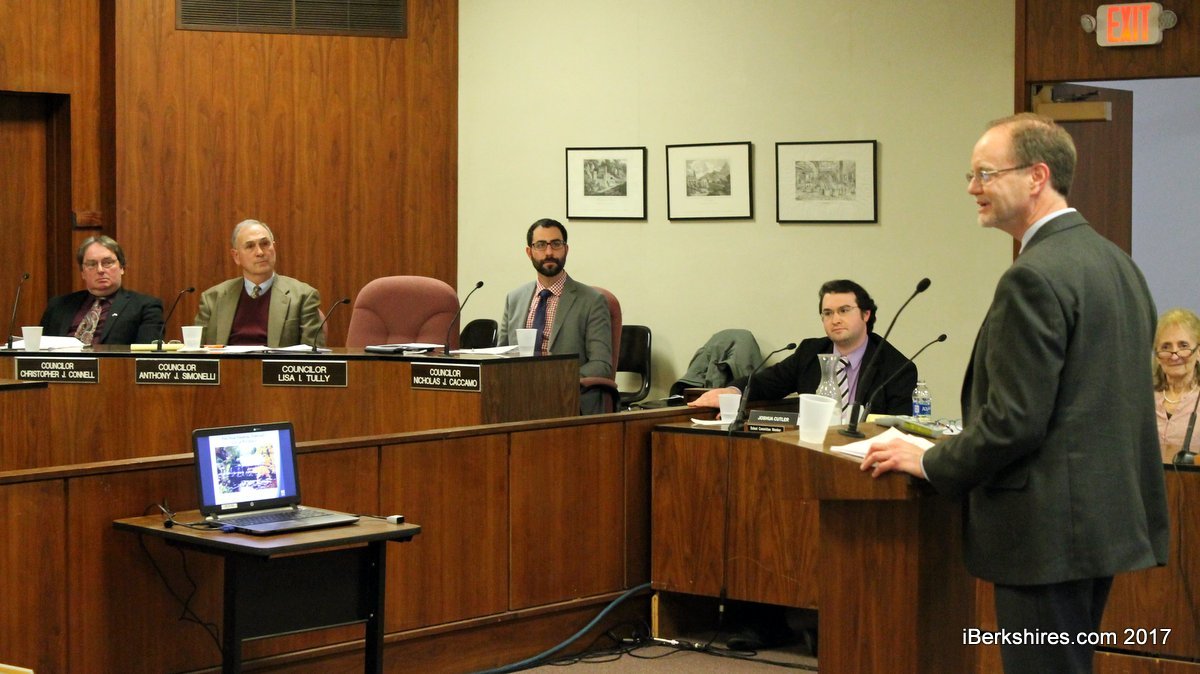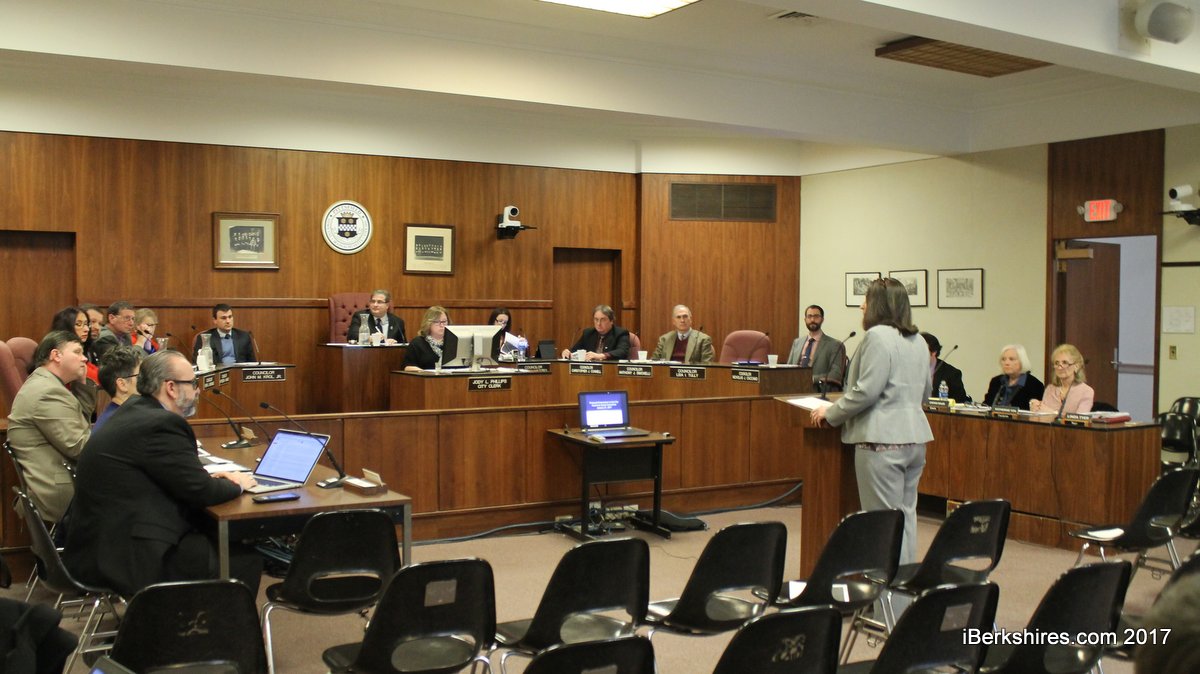Advisers Lay Out Pittsfield's Financial PictureBy Andy McKeever, iBerkshires Staff
03:44AM / Wednesday, February 01, 2017 | |
 Fredrick Kingsley, of the University of Massachusetts Collins Center, presented a forecasting model he built for the city of Pittsfield to help plan for the future challenges. Fredrick Kingsley, of the University of Massachusetts Collins Center, presented a forecasting model he built for the city of Pittsfield to help plan for the future challenges. |
.JPG)
Auditor Thomas Scanlon said the city needs to raise property values significantly in order to raise the levy ceiling.
PITTSFIELD, Mass. — The city's reserves are dwindling and the ability to tax is eroding away.
But buried under the financial struggles, a couple gems of optimism poked its head through Tuesday night when financial advisers presented a mostly dreary picture of the city's financials.
The bad news is what has been repeated over and over again since last year when this presentation was given — the city is inching ever closer to the levy ceiling, limiting its ability to tax. The good news is a high percentage of residents are paying their taxes, incomes and local receipts are going up, and slowly property values are following.
There is still a lot of work to right the city's financial ship and advisers told both the School Committee and the City Council on Tuesday to focus on raising property values and building reserves.
"It is pretty clear to me that the tax levy and the city's assessed values is something everyone should get behind to grow," Fredrick Kingsley, of the University of Massachusetts Collins Center, said.
"If you do not solve this, the outlook is not that good."
Kingsley, who was commissioned through a state grant to help craft forecasting models for the city's Finance Department, said the city's residential property values hit a peak in 2009, flattened out in 2010, and then started to decline in 2011. The city's total assessed values followed the same trend while the city's commercial and industrial value remained stable.
But, values have somewhat flattened in recent years while costs have been increasing.
State laws allow cities and towns to raise the amount raised from taxes by 2.5 percent from year to year plus a "new growth" amount determined by a state formula, giving a levy limit. The laws also creates a levy ceiling to ensure that no more than a quarter of a municipality's property values are being taxed.
Last year, the city hit a crossing point. As property values remained level and the levy limit continued to grow, the ceiling ultimately became lower than the limit. Had that not happened, the city would have had an additional $1.3 million in its excess levy capacity.
Auditor Thomas Scanlon of Scanlon Associates said the ability to tax is the "No. 1" asset a city can have and the city is losing that slowly. As of Tuesday, the city has excess levy capacity of $2.9 million. Scanlon says if the city's current trends continue then the city will be hitting the ceiling by 2019.
"Unless you have a growth in real estate, you will be at the levy ceiling from here on," Scanlon said.
He said the only ways to change that aspect would be to significantly raise property values or "to have new revenue streams to get the tax rate down or cut budgets."
The trend could be particularly troublesome because about 54 percent of the city's budget is funded from the property taxes.
"As management going forward, you have some struggles ahead of you and the financial statements are indicative of that," Scanlon said.
The rest of the revenues are derived from state aid, which Kingsley said took a massive drop from 2010 until 2012, and local receipts. Last year, the state aid was higher than ever before at some $50.4 million. The largest amount of state aid has come in Chapter 70 aid for education.
Kingsley said the amount expected through local receipts has been conservative and routinely the city takes in more than it budgets to spend. But, that difference has been closing so he doesn't suggest aggressively raising those expectations.
Meanwhile, a second issue facing the city is reserves. In the last four years the city's free cash and stabilization collectively have dropped by about $2 million. The stabilization has gradually been increased with each budget but only by a small amount. Free cash has dropped some $2 million overall.
"You used $3 million and you only generated $1.5 million," Scanlon said of last year.
The city used $2 million of free cash to offset the tax rate and then made additional appropriations.
Many other cities and towns have used free cash each year to lower the property tax burden on the residents. But Scanlon, and other auditors, have suggested on multiple occasions to move away from that practice. Scanlon said if the city doesn't spend its free cash in the upcoming year, that number will grow back up to the $5 million range from the current $3.5 million.
"The city over the past several fiscal years has used $2 million, $1.5 million, and $2 million again to offset the tax rate. I would urge the city to move away from that type of use," Scanlon said.
This year the city was able to get the state to release $1.6 million which was in a restricted reserve account. The move essentially brings that amount to the city's books, boosting the reserve numbers. With that included the city has $8.3 million in reserve. Scanlon said cities should have at between 5 to 10 percent of its annual budget in reserve accounts. The city has 6 percent now.
But Scanlon did notice that the city has a 96 percent collection rate when it comes to taxes, which shows a low level of delinquency.
"You have always been in the 96 percent range, which is a good collection rate," Scanlon said.
Kingsley took a forward look and expressed concern with the rate health insurance costs are growing. He projected a 6 percent increase in the coming year but that has since been estimated to come in even higher.
"There is quite a bit of expenditure growth in those numbers," Kingsley said.
He added pension costs are going up "fairly aggressively" as well and expects that to continue in the range of $700,000 or so a year.

Mayor Linda Tyer addresses the joint meeting of the School Committee and the City Council.
He looked at the existing contracts throughout the city and the already approved debt service creates a trend over the next handful of years of costs continually increasing.
But, that projection didn't include any new contracts negotiated or even any additional capital spending — it was a forecast which just showed the cost to complete everything in the existing structure and contracts with no new programs or additional expenditures.
Kingsley repeated his urge that the city focuses on doing everything it can to bring new development and maintain existing values.
"It is pretty clear to me that the No. 1 problem fiscally in this city right now is the levy ceiling," Kingsley said. "You really need to get everybody on the same page and work toward enhancing the city's assessed values."
There are some subtle signs buried in the city's financial condition that things could turn around. The city's property values have been trending upward, and the levy ceiling was raised accordingly since last year. The city saw about a $17 million increase in property values, as of November when the tax rate was set.
Kingsley said that according to Department of Revenue numbers, the total income filed on resident's taxes has increased as well, and those numbers are dated some two years in the past. Kingsley said total incomes were raised by more than $50 million, based on 2014 returns.
"The city's income as reported to DOR for income tax purposes actually rose by $50 million. That was a real positive," Kingsley said. "That was the largest increase for the city on a percentage basis in the last four or five years."
Additionally, revenues from motor vehicle excise and meals taxes are up.
"Things are improving if you talk to our assessor. We hit bottom and we are coming back," Ward 6 Councilor John Krol said.
While those signs are good, the values aren't growing nearly fast enough at this time to avoid the levy ceiling, which could have consequences in a number of ways.
"The task at hand is to change that and make [the tax ceiling] grow by a $1 million or $2 million," Kingsley said. "This is going to take time to turn around. This is not something that is going to happen in 2018 and that is the power of this [forecasting mode] because you can set the course."
Krol suggested that the city should avoid making drastic cuts to the budget, particularly in the fields of education, because that will decrease property values, adding to the difficulty.
Councilor at Large Kathleen Amuso doesn't see much of a way to avoid significant cuts though. Amuso, who used to serve on the School Committee, said on average each year the School Department needs at least $1.6 million to fulfill contractual obligations. That won't allow the city much leeway before it hits the ceiling.
During last year's budget session she started off being aggressive toward cutting budget lines. Next time she doesn't want to be in that position of having to find individual line cuts. She called on Mayor Linda Tyer and Superintendent Jason McCandless to bring forth a budget that doesn't raise the taxes nearly as much as this year.
"I would like you to make the difficult decisions and bring some things to us and not have us look at the budget and nickel and dime it," Amuso said. "I thought last year was going to be a difficult budget season. I think this year is going to be more difficult."
Ward 4 Councilor Christopher Connell suggested finding additional revenue opportunities to help avoid having so much depend on the property values.
| 
 MEMBER SIGN IN
MEMBER SIGN IN
 MEMBER SIGN IN
MEMBER SIGN IN